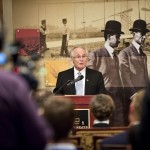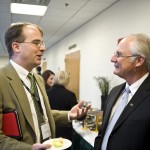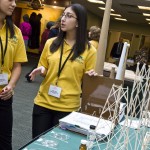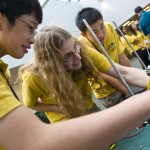
Wright State President David R. Hopkins speaking at Science Olympiad press conference
Wright State University announced on Dec. 1 that it has been selected as the site for the National Science Olympiad Tournament, which pits teams of bright young students from around the country in science and engineering competitions that often involve everything from astronomy and fossils to balsa structures and battery-powered vehicles.
Wright State will play host to the National Science Olympiad Tournament in 2013, as well as two events leading up to it—invitational tournaments in February 2011 and January 2012.
The three events are expected to pour an estimated $1.6 million into the region in restaurant, motel and other business.
“The National Science Olympiad is the pinnacle of science-related competitions for our sharpest middle and high school students,” said Wright State President David R. Hopkins. “Our campus and our region will serve as a national stage for the country’s best young scientists.”
Science Olympiad features competitions in biology, chemistry, earth science, astronomy, physics and technology.
The 20-plus events, which involve top teams from each state of up to 15 students per team, include the construction of aquifers, helicopters and mousetrap-powered vehicles. Other events test knowledge of anatomy, fossils, optics, protein modeling and food-borne illnesses.
“The students that are going to be coming to the national tournament are the cream of the crop from all across the United States,” said CeAnn Chalker, a national committee chair for Science Olympiad.
Science Olympiad competitions, which started more than 25 years ago, were modeled after successful programs in Delaware and Michigan. The school-based teams prepare and practice throughout the year, then compete in regional and state tournaments. The top teams advance to the National Science Olympiad Tournament.
Chalker said preparing for Science Olympiad competitions enables students to learn and gain expertise outside the classroom in areas about which they are passionate.
She said her own son’s Science Olympiad project was similar to the Ph.D. research he later did as a university student in North Carolina.
“For some students, it leads them into their career,” Chalker said. “For other students, it teaches them all the different possibilities out there.”
Science Olympiad also serves as a bonding experience for the students, who often come from very different backgrounds.
“It’s the most eclectic group of students you will find, and these bonds last forever,” Chalker said.
In hosting the National Science Olympiad Tournament, Wright State will be joining previous hosts such as the University of Chicago, George Washington University, the University of Colorado, Indiana University and the University of Illinois.
“We’re going to get our name out there in a big way,” said Theresa Mileo, Wright State’s director of ceremonies and protocol. “Once the competitors start arriving next year, we will build the excitement through 2013.”
Mileo said the competitions will occur at venues across the campus. She said the university, home to nearly 20,000 students, will be able to accommodate the hundreds of middle- and high school students who will be pouring in for the national event.
The Science Olympiad Invitational, which will be held Feb. 26, 2011, will feature 90 teams and up to 2,250 people. At total of 120 teams with up to 3,000 people will attend the Invitational Tournament to be held Jan. 28, 2012.
And the National Science Olympiad Tournament, to be held May 17–18, 2013, is expected to involve 120 teams with up to 5,000 people that includes more than 100 National Science Olympiad Committee members, event supervisors and state directors.
“When this many people visit for an event, they spend money on lodging, dining and shopping that boosts the bottom line of local retailers,” said Kathleen Young, executive director of the Greene County Convention & Visitors Bureau. “It also gives us an opportunity to show visitors just how friendly we can be.”
President Obama has underscored the importance of Science Olympiad, comparing it to high-profile sports competitions.
In a November 2009 speech on science education, Obama said: “If you win the NCAA championship, you come to the White House. Well, if you’re a young person and you’ve produced the best experiment or design, the best hardware or software, you ought to be recognized for that achievement, too.”
Obama later held a White House Science Fair in which he honored six Science Olympiad champions, including a team from Centerville that won its second straight national championship.
Science Olympiad is a national nonprofit organization whose mission is to improve the quality of science education, increase interest in science, attract more students to science careers, foster teamwork, emphasize the problem-solving aspects of science and develop a technologically literate workforce.
Chalker, who has coached Science Olympiad teams, said she is astonished at the enthusiasm of the students. When traveling to tournaments, many of the students prepare right up to the competition, studying as they ride on the bus and wait in motel lobbies.
“I’m not making them do it; they want to do it,” she said. “They love it.”
- Dr. Hopkins speaking at Science Olympiad press conference





 Wright State celebrates homecoming with week-long block party
Wright State celebrates homecoming with week-long block party  Wright State baseball to take on Dayton Flyers at Day Air Ballpark April 15
Wright State baseball to take on Dayton Flyers at Day Air Ballpark April 15  Wright State joins selective U.S. Space Command Academic Engagement Enterprise
Wright State joins selective U.S. Space Command Academic Engagement Enterprise  Glowing grad
Glowing grad  Wright State’s Homecoming Week features block party-inspired events Feb. 4–7 on the Dayton Campus
Wright State’s Homecoming Week features block party-inspired events Feb. 4–7 on the Dayton Campus 